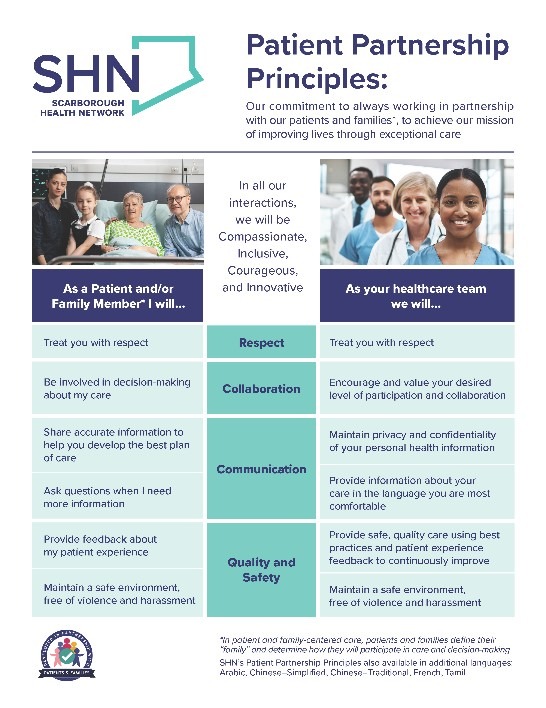During Patient Experience (PX) Week, we recognize healthcare staff impacting the patient experience everyday. PX Week provides a focused time for organizations to celebrate accomplishments, re-energize efforts, and honor the people who impact patient experience everyday.
To recognize PX Week, we sat down with Dr. Elaine Yeung, SHN Chief of Staff, and Chantel Wicks, a Patient and Family Advisor (PFA), for a discussion on chronic disease, the patient experience, and how partnerships between health care providers and patients rely on a strong foundation of trust.
Welcome! How you know each other?
Chantel: “Dr. Yeung is my first champion. I was diagnosed with inflammatory bowel disease over 16 years ago. At the time that I was my sickest—physically, mentally, and just all around. Dr. Yeung was my gastroenterologist and you know quite frankly, my hero. It was her compassion and her ability to listen to me as an individual, to hear my voice as a patient, to care for me in a way that went above and beyond the expectations that I ever had. She gave me that strength to believe in myself, to let me know that it was OK, as a patient, to have a voice and to feel heard. I’m so grateful for Dr. Yeung.”
Dr. Yeung: “You were one of my first patients! As providers at that point, we were all quite afraid of that disease for our patients because we didn’t know as much as we know today. We had a very limited number of drugs at that point, and we’ve seen a lot of young people get very, very sick. The way you presented—there were some atypical features, too. So, there were parts that were tough to treat, which is why I made sure I didn’t give up on helping you feel better.”
For patients with chronic diseases, how does communication impact your ability to manage the disease?
Chantel: “Communication in timely manner in a way that we understand by our healthcare team is pivotal as somebody who’s chronically ill. Constantly keeping those lines of communication open is vital not only to the physical health of someone, but I truly believe to their mental and emotional health as well. I think it’s important that patients are always open and communicating with their healthcare providers and they’re not hiding anything. I am a strong believer that knowledge is power. The more you know and the more conversations you have provides people with a sense of understanding. It builds that trust.”
Does knowing about patients’ lives improve the patient-physician relationship?
Dr. Yeung: “You have to listen to what your patients’ symptoms are. You need to know that they’re not only your patient, but they are someone’s sister, parent, or child. You cannot treat people that come to you like they’re just a number or another patient. Everybody is unique. Sometimes when you have a busy day, it’s very tough to spend the time or to have the attention for each and every patient. But you always want to create space and make sure you see them again or talk to them again. Really make sure you understand what they’re going through and come up with a treatment plan collaboratively.
It’s often not what you do, but how you make people feel. And that’s a big part of being a provider. You can have all the knowledge in the world and be the most effective practitioner. But if you don’t make people feel respected or heard, you didn’t do well in that encounter. Some people think that if they spend more time with patients and they put in more energy, they get more tired and burnt out. But if you actually love your job and want to help people, that’s actually where you get inspired and get more energy.”
Chantel: “Communication is 100% not just about what you say, but also how you say it. It’s how you feel when you walk into a space. Do you feel safe? Do you feel confident? Do you feel that this person who is providing care for you has your best interest and is truly going to do whatever they can to help you? Dr. Yeung didn’t need to say those things to me. I just felt them based on her actions and her taking that time to listen.
I have learned a lot and am a very connected and involved patient in the IBD community. I take great pride in that. Having the confidence, trust, and feeling heard and that decisions made were shared between myself and Dr. Yeung, gave me the confidence to become what I call a VIP—a Very Informed Patient.”
What does Patient Partnership mean to you?
Dr. Yeung: “I think it’s collaboration. I think that’s the one thing that we often forget because we’ve been taught to figure out what the problem is and prescribe. But you know, treating a disease is not just about treating the disease. You have to teach and treat the whole person. There’s so many things going on in their lives that if you don’t figure out what’s going on, your treatment plan is not always going to work. So, I think that collaboration is something that we have to focus on.”
The initial trust we build is so important. Everyone has the right to know and ask questions about their health and to feel that they have some control. I mean, a lot of times we can’t control what happens to us, but you want to at least be informed. You want healthcare providers to speak to you with respect and provide you with as much information as possible to help you make the right decision for yourself at different stages of your life.
Chantel: “You have to respect yourself and respect others. Everything is about respect. If you don’t respect someone, you’re not going to be open to collaborating with them. You are not going to communicate with them in an effective way. You’re not going to hear them or give them a voice.
We’re so diverse here in Scarborough, and that’s what makes us so beautiful. There are barriers in healthcare, whether that be a language barrier or a knowledge barrier. If you respect everyone involved, then you find ways to make sure everyone is understanding and feeling involved. That affects quality of care. If people feel safe and if you respect one another, you will feel safe. It builds that environment. Respect is the foundation. Without it, there’s nothing.”
Patient Partnership Principles
This PX Week, we are excited to share SHN’s brand new Patient Partnership Principles demonstrating our commitment to always working in partnership with our patients and families.
At SHN, we believe that patient and family-centred care is achieved through respect, collaboration, communication, and safe, quality care. This approach results in optimal health, patient safety, health equity, and a positive patient and family experience.


